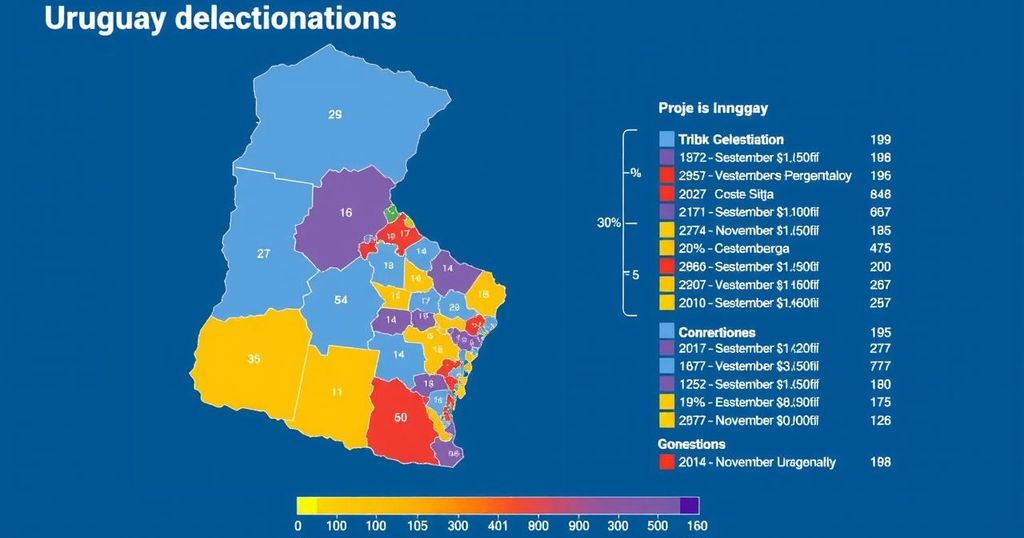Uruguay’s presidential election on Sunday resulted in a necessary runoff between leftist candidate Yamandú Orsi and center-right candidate Álvaro Delgado, reflecting voter satisfaction with the current regime yet seeking enhanced social welfare measures. High voter turnout (89%) amid pressing socio-economic issues and an upcoming social security referendum underscores the electorate’s commitment to shaping future governance in a nation recognized for its democratic stability.
In a significant development within Uruguay’s political landscape, the country’s presidential election on Sunday resulted in a decisive separation from the prevailing political sentiments seen in neighboring Argentina and Brazil. Preliminary results indicate a run-off will be necessary, as the leading candidates, Yamandú Orsi from the leftist Broad Front alliance and Álvaro Delgado from the center-right governing coalition, each garnered a substantial share of the vote. As of now, with over 60% of the ballots counted, Orsi leads with projections of 42% to 44%, while Delgado has received approximately 27% to 28% of the votes. Voter turnout reached an impressive 89% among the 2.7 million eligible participants, reflecting Uruguay’s strong democratic traditions where voting is compulsory. The high engagement level further illustrates the societal commitment to the electoral process, even though both candidates recognized that no individual surpassed the 50% threshold to avoid a second round of voting scheduled for November 24. Interestingly, despite broader trends of voter dissatisfaction across Latin America, the electorate in Uruguay appears comparatively content with the status quo, attributable to President Luis Lacalle Pou’s performance. The upcoming electoral contest will focus heavily on pressing social issues, including crime, child poverty, and education, as both candidates delineate their approaches to governance and societal welfare. In addition to the presidential race, a crucial constitutional referendum concerning the social security system has captivated public discourse, overshadowing some campaign elements. A passing vote on this referendum would significantly impact the fiscal landscape and public trust in government-managed trusts for private savings, heightening the stakes for the upcoming electoral periods. Both Orsi and Delgado have expressed disapproval of the proposal, illustrating a consensus on some economic matters despite their distinct political platforms. This election marks a pivotal moment in which voters will ultimately determine the direction of Uruguay’s policies and governance, particularly as societal challenges continue to gain prominence in public attention.
Uruguay has long been recognized as a stalwart of stability and democracy in South America, often setting itself apart from the political dynamics observed in larger neighbors like Argentina and Brazil. With compulsory voting and a highly engaged electorate, the nation’s political environment promotes robust participation in democratic processes. Historically, the Broad Front coalition held the presidency continuously from 2005 to 2019, implementing progressive social policies and fostering economic growth. The current election cycle represents a return to this contentious political arena, especially as the electorate confronts rising crime rates, poverty levels, and an impending constitutional referendum regarding the social security system. These elections not only signify a choice between differing political ideologies but also embody critical decisions regarding the welfare and economic strategies intended to enhance the lives of Uruguayan citizens.
The presidential election in Uruguay signals a pivotal turning point as it ventures towards a run-off, highlighting the strength of the leftist Broad Front against the center-right’s governing coalition. With the electorate demonstrating substantial turnout and a willingness to engage with critical socio-economic issues, the upcoming face-off in November will likely pivot on how well each candidate articulates their visions for addressing crime, poverty, and educational challenges, all while navigating an intricate landscape shaped by public sentiment towards social security reform. As Uruguay stands as a model of democracy, the decisions made in this electoral climate will have far-reaching implications for the nation’s future governance.
Original Source: www.firstpost.com






